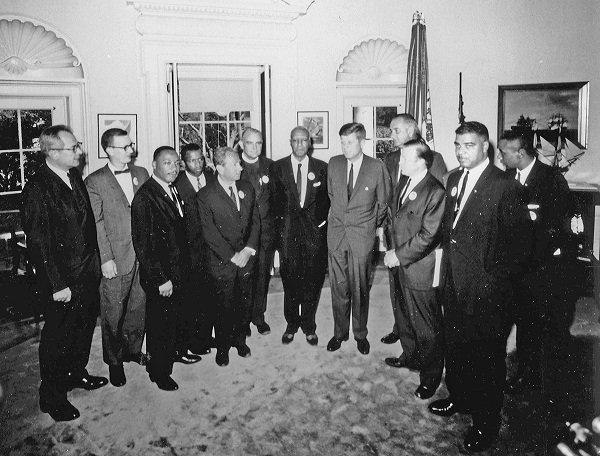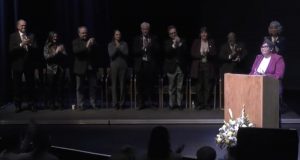EEA: Why did 4J dissolve its equity department?
7 min read
Portrait
At the Eugene 4J board meeting Oct. 18, questions about why the school district dissolved its equity department.
Sabrina Gordon (Eugene Education Association): I am Sabrina Gordon, president of Eugene Education Association, and I’m joined tonight by EEA Vice President Imelda Cortez.
[00:00:19] We are here tonight to speak about 4J’s decision to dissolve the Department of Diversity, Equity and Inclusion.
[00:00:27] In the words of John Lewis: ‘When you see something that is not right, not fair, not just, you have to speak up. You have to say something. You have to do something.’
[00:00:39] Dissolving this department directly impacts our BIPOC and historically underserved students, staff and community. And we cannot help but wonder how this decision fits into the ‘Three Big Rocks’ of the 4J school district:
- Safety and well-being for students and staff,
- A coordinated focus on equitable access and advancement for all, with an amplified focus on the desires of those who have been historically underserved, and
- Meaningful engagement and timely communication.
[00:01:11] EEA is concerned that the decision to dissolve this department was made without seeking authentic input from educators, students, and families from our traditionally underserved populations.
[00:01:26] We are also concerned that there has not been transparency or clear communication with our staff and community about this decision. We wonder whether 4J’s equity tool was used in making this decision to ensure that dissolving this department would not marginalize or harm students, staff, families, and communities.
[00:01:47] We also wonder how impacts of this change are being monitored.
[00:01:53] At a previous board meeting, the district stated that it had dissolved the department because it was not moving the dial for our traditionally underserved populations. We wonder how the district measured the impact of this program prior to coming to this conclusion.
[00:02:08] To our knowledge, we only had a Department of Diversity, Equity, and Inclusion that was fully staffed by more than just one person for two school years, 2021 and 2022.
[00:02:18] Prior to 2021, our district had one person in an equity role. Those in the position prior to our previous two directors were spread far too thinly and lacked resources to really move the dial for our traditionally underserved populations. Simply put, their work was impossible and unsustainable for one person.
[00:02:38] The work of dismantling systemic structures is unattainable, impossible, and exhausting when you’re doing the work alone. To have the sole responsibility to change the system takes an emotional toll on a person, which then leads to racial battle fatigue.
[00:02:54] To judge the success of a department based on what had been done in our district prior to 2021 is unequivocally wrong.
[00:03:02] How can we expect one person with a daunting workload to exact change in our district when they do not have the resources or support of others working with them?
[00:03:12] It is important to note that for the 2021 and 2022 academic school years, we finally had a real department, led by not just one, but two BIPOC administrators that reported directly to the superintendent and had institutional power, something that previous DEI admin had not had.
[00:03:31] Not only did they have institutional power, they were able to create a department that included affinity group program coordinators. equity managers, and wraparound services staff, just to name a few. This department then became the support system that is necessary to sustain and uplift those involved in the work as they tackle the ongoing challenges necessary for making systemic change that benefits BIPOC staff, and most importantly, students of color, a reality.
[00:04:00] To do the work of equity is to, as John Lewis eloquently stated, acknowledge that there are people hurting, there are people suffering. So we have an obligation, a mandate to do something.
[00:04:12] While we assume the best of intentions were part of the decision, as a BIPOC educator, who is a 4J graduate and has taught in the school district for 20 years, I would find it remiss if I did not publicly state the impact that this decision has had on those of us that identify as BIPOC educators.
[00:04:30] Comments that imply we don’t need a DEI department because it has overtaken instruction are equivalent to using the ‘I don’t see color’ argument—which in turn sends a message that our experiences as BIPOC students and educators in this district do not matter.
[00:04:45] Finally, I leave you with another quote from the great John Lewis. ‘Ours is not the struggle of one day, one week or one year… ours is the struggle of a lifetime, or maybe even many lifetimes. And each of us in every generation must do our part.’
[00:05:02] Ask yourselves: Is the dissolution of the Department of Diversity, Equity, and Inclusion how you want to be remembered as having done your part to support our staff—and most importantly, our students and communities that have been historically underserved?
[00:05:17] As Maya Angelou once said, ‘We may forget what you said and what you did, but we will never forget how you made us feel.’ Thank you.
[00:05:47] John Q: During the public comment period:
[00:05:51] Indigo Amarys (CALC): My name is Indigo Amarys. I work at Community Alliance of Lane County doing educational equity work, and I went through 4J (South Eugene High School Class of 2018). A big part of my job is connecting with parents, students, and staff around what they are seeing in our schools, which is what brings me here tonight.
[00:06:06] I’m concerned about the dissolution of the equity department.
[00:06:09] In winter of last year, I had an excellent meeting with one of the directors of this department, where I was walked through the 30- person staff, their roles and their focuses. I was impressed by this show of 4J commitment and investment to equity and having an entire department centered around doing this work.
[00:06:24] Throughout the last school year, I experienced equity department staff being some of the most responsive, empathetic, and culturally- aware advocates for the students and families of color that I work with.
[00:06:32] There are community members, parents, students, and staff who feel uncertainty and discomfort around these restructured choices. There are many more who are unaware of this happening at all.
[00:06:41] On the other hand, I am encouraged by the shift of the Equity Advisory Committee to being a policy reviewing body. The folks on this committee have important thoughts and perspectives and should truly be leaned on like the resource that they are.
[00:06:52] I feel hopeful that the Advisory Committee may work with the board to revisit the racial harassment policy in an upcoming work session. I hope you can acknowledge the merits of this policy and consider: Where are the points of failure? Are they within the policy language or the implementation and enforcement?
[00:07:06] Is this policy being placed upon an infrastructure that cannot support it? After all, this policy relies on folks being ready to have hard conversations about racism in our schools.
[00:07:14] I hope the conversation also touches on the district’s responsibilities as described in the policy, which include ensuring appropriate documentation of reported incidents, conducting an annual review of major incidents, and reporting that information annually to the board, which we have not seen so far.
[00:07:29] I also know there have been suggestions for a follow-up conversation around the high school schedule change. One of the motivations I repeatedly heard for this schedule change was an equity push. I spoke with students who were excited about flex periods providing longer affinity group meeting times.
[00:07:42] However, the same students are now telling me that due to New Contact being introduced during these flex classes, attending affinity groups is like skipping class. I’m hoping when we hear about affinity groups later tonight, this will be mentioned. I’m also hoping there will be transparency around budget decreases for affinity groups, which is another thing that I’m hearing.
[00:07:59] Many board members ran on platforms of transparency, communication, equity, and accountability, and I see this as an opportunity to make those ideas actionable. I’m asking for transparency around why district equity advancements are being rolled back.
[00:08:12] And equity being in everything 4J does is not an explanation, it’s an ideal. I resonate with the fear of equity becoming a buzzword, but I fear more what it means for the district to do equity work without being able to say it. Not to mention, without explanation, students are seeing spaces, departments, and roles created with them in mind being dissolved or defunded, which is sending a message.
[00:08:32] Please consider what it means to be committed to equity and creating belonging in our school community. Thank you.
[00:08:48] John Q: Questions about why 4J dissolved its equity department, and the message that sends to the whole community.
[00:08:54] We asked when 4J will share its first report under the district’s racial harassment policy, adopted in March 2022. Board chair Maya Rabasa said (by email) the board hopes to discuss that report in November.
Image credit: Cecil W. Stoughton, Public domain, via Wikimedia Commons. Civil rights leaders meet with President John F. Kennedy in the Oval Office of the White House after the March on Washington, D.C. Left to Right — Willard Wirtz, Matthew Ahmann, Martin Luther King, Jr (SCLC), John Lewis, Rabbi Joachin Prinz, Eugene Carson Blake, A. Philip Randolph, President John F. Kennedy, Vice President Lyndon Johnson, Walter Reuther (UAW), Whitney Young, Floyd McKissick. Others not in order: Roy Wilkins (NAACP).





